33 Ways to Get Higher Yields
For more than a decade, income investors have been plagued by paucity wrapped in misery.


Profit and prosper with the best of Kiplinger's advice on investing, taxes, retirement, personal finance and much more. Delivered daily. Enter your email in the box and click Sign Me Up.
You are now subscribed
Your newsletter sign-up was successful
Want to add more newsletters?

Delivered daily
Kiplinger Today
Profit and prosper with the best of Kiplinger's advice on investing, taxes, retirement, personal finance and much more delivered daily. Smart money moves start here.

Sent five days a week
Kiplinger A Step Ahead
Get practical help to make better financial decisions in your everyday life, from spending to savings on top deals.

Delivered daily
Kiplinger Closing Bell
Get today's biggest financial and investing headlines delivered to your inbox every day the U.S. stock market is open.

Sent twice a week
Kiplinger Adviser Intel
Financial pros across the country share best practices and fresh tactics to preserve and grow your wealth.

Delivered weekly
Kiplinger Tax Tips
Trim your federal and state tax bills with practical tax-planning and tax-cutting strategies.

Sent twice a week
Kiplinger Retirement Tips
Your twice-a-week guide to planning and enjoying a financially secure and richly rewarding retirement

Sent bimonthly.
Kiplinger Adviser Angle
Insights for advisers, wealth managers and other financial professionals.

Sent twice a week
Kiplinger Investing Weekly
Your twice-a-week roundup of promising stocks, funds, companies and industries you should consider, ones you should avoid, and why.

Sent weekly for six weeks
Kiplinger Invest for Retirement
Your step-by-step six-part series on how to invest for retirement, from devising a successful strategy to exactly which investments to choose.
For more than a decade, income investors have been plagued by paucity wrapped in misery. The bellwether 10-year Treasury note has doled out an average 2.6% interest since 2008. Although the Federal Reserve has nudged its target interest rate range to 2.25% to 2.50%, it has signaled that it’s done raising rates for now.
Even worse, the yield on the 10-year T-note briefly sank below the yield on the three-month T-bill—an unusual inversion that can sometimes herald a recession and lower yields ahead. The takeaway: Locking your money up for longer periods is rarely worth the negligible increase in yield.
What could increase your yield these days? Being a little more adventurous when it comes to credit quality. When you’re a bond investor, you’re also a lender, and borrowers with questionable credit must pay higher yields. Similarly, stocks with above-average yields probably have some skeletons in their balance sheets.
You can ameliorate credit risk—but not eliminate it—through diversification. Invest in a mutual fund, say, rather than a single issue. And invest in several different types of high-yielding investments—for example, investment-grade bonds, preferred stocks and real estate investment trusts—rather than just one category.
Despite such caveats, income investing is not as bad as it was in 2015, when it was hard to milk even a penny’s interest out of a money market. Now you can get 3.3% or more from no-risk certificates of deposit at a bank. We’ll show you 33 ways to find the best yields for the risk you’re willing to take, ranging from 2% all the way up to 12%. Just remember that the higher the payout, the greater the potential for some rough waters.
Prices, yields and other data are as of April 19.

Short-Term Accounts
Short-term interest rates largely follow the Fed’s interest rate policy. Most observers in 2018 thought that would mean higher rates in 2019. But slowing economic growth in the fourth quarter of 2018 and the near-death experience of the bull market in stocks changed that. The Fed’s rate-hiking campaign is likely on hold for 2019.
Still, money markets are good bets for money you can’t stand to lose. Money market funds are mutual funds that invest in very-short-term, interest-bearing securities. They pay out what they earn, less expenses. A bank money market account’s yield depends on the Fed’s benchmark rate and the bank’s need for deposits.
- The risks: Money market mutual funds aren’t insured, but they have a solid track record. The funds are designed to maintain a $1 share value; only two have allowed their shares to slip below $1 since 1994. The biggest risk with a bank money market deposit account is that your bank won’t raise rates quickly when market interest rates rise but will be quick on the draw when rates fall. MMDAs are insured up to $250,000 by the federal government.
- How to invest: The best MMDA yields are from online banks, which don’t have to pay to maintain brick-and-mortar branches. Currently, a top-yielding MMDA is from Investors eAccess, which is run by Investors Bank in New Jersey. The account has no minimum, has an annual percentage yield of 2.5% and allows six withdrawals per month.
You’ll get a bump from a short-term CD, provided you can keep your money locked up for a year. Merrick Bank, in Springfield, Mo., offers a one-year CD yielding 2.9%, with a $25,000 minimum. The early-withdrawal penalty is 2% of the account balance or seven days’ interest, whichever is larger. The top five-year CD yield was recently 3.4%, from First National Bank of America in East Lansing, Mich.
Your primary concern in a money fund should be how much it charges in expenses. Vanguard Prime Money Market Fund (symbol VMMXX, yield 2.5%) charges an ultralow 0.16% a year and consistently sports above-average yields.
Investors in high tax brackets might consider a tax-free money fund, whose interest is free from federal (and some state) income taxes, such as Vanguard Municipal Money Market Fund (VMSXX 1.6%). To someone paying the maximum 40.8% federal tax rate, which includes the 3.8% net investment income tax, the fund has the equivalent of a 2.7% taxable yield. (To compute a muni’s taxable-equivalent yield, subtract your tax bracket from 1, and divide the muni’s yield by that. In this case, divide 1.6% by 1 minus 40.8%, or 59.2%). The fund’s expense ratio is 0.15%.

Municipal Bonds
Muni bonds are IOUs issued by states, municipalities and counties. At first glance, muni yields look as exciting as a month in traction. A 10-year, AAA-rated national muni yields 2.0%, on average, compared with 2.6% for a 10-year Treasury note.
But the charm of a muni bond isn’t its yield; it’s that the interest is free from federal taxes—and, if the bond is issued by the state where you live, from state and local taxes as well. As with tax-free money funds, investors should consider a muni fund’s taxable equivalent yield; in the case above, it would be 3.4% for someone paying the top 40.8% federal rate.
Yields get better as you go down in credit quality. An A-rated 10-year muni—two notches down from AAA but still good—yields 2.3%, on average, or 3.9% for someone paying the top rate.
- The risks: Munis are remarkably safe from a credit perspective, even considering that defaults have inched up in recent years. But like all bonds, munis are subject to interest rate risk. If rates rise, your bond’s value will drop (and vice versa), because interest rates and bond prices typically move in opposite directions. If you own an individual bond and hold it until it matures, you’ll most likely get your full principal and interest. The value of muni funds, however, will vary every day.
- How to invest: Most investors should use a mutual fund or ETF, rather than pick their own individual bonds. Look for funds with rock-bottom expenses, such as Vanguard Limited-Term Tax-Exempt (VMLTX, 1.8%). The fund charges just 0.17%, and yields the equivalent of 3% for someone paying the highest federal tax rate. It’s a short-term fund, which means it’s less sensitive to interest rate swings. That means its share price would fall less than longer-term funds’ prices if rates were to rise. The average credit quality of the fund’s holdings is a solid AA–.
- Fidelity Intermediate Municipal Income (FLTMX, 2.0%), a member of the Kiplinger 25, the list of our favorite no-load funds, gains a bit of yield (a taxable equivalent of 3.4% for those at the top rate) by investing in slightly longer-term bonds. The fund’s expense ratio is 0.37%; the largest percentage of assets, 39%, is in AA bonds.
- Vanguard High-Yield Tax-Exempt Fund Investor Shares (VWAHX, 2.9%) also charges just 0.17% in fees and yields 4.9% on a taxable-equivalent basis for someone at the highest rate. The extra yield comes from investing in a sampling of riskier bonds. But the fund’s average BBB+ credit rating is still pretty good, and its return has beaten 96% of high-yield muni funds over the past 15 years.
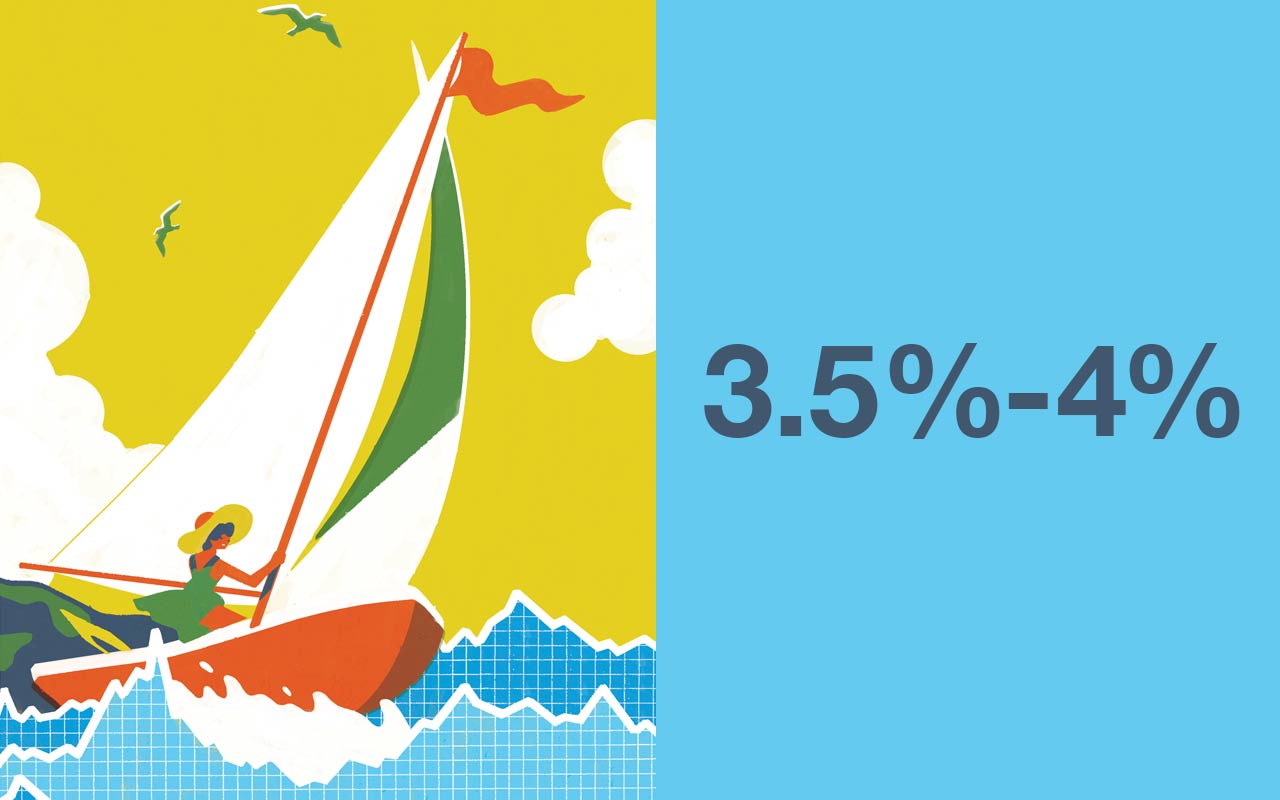
Investment-Grade Bonds
You get higher yields from corporate bonds than you do from government bonds because corporations are more likely to default. But that risk is slim. The one-year average default rate for investment-grade bonds (those rated BBB– or higher), is just 0.09%, going back to 1981, says Standard & Poor’s.
And corporate bonds rated AAA and maturing in 20 or more years recently yielded 3.7%, on average, while 20-year Treasury bonds yielded 2.8% and 30-year T-bonds, 3.0%. You can earn even more with bonds from firms with lightly dinged credit ratings. Bonds rated BBB yield an average 4.0%.
- The risks: The longer-term bond market moves independently of the Fed and could nudge yields higher (and prices lower) if inflation worries pick up. Though corporate defaults are rare, they can be devastating. Lehman Brothers, the brokerage firm whose bankruptcy helped fuel the Great Recession, once boasted an investment-grade credit rating.
- How to invest: Active managers select the bonds at Dodge & Cox Income (DODIX, 3.5%). This fund has beaten 84% of its peers over the past 15 years, using a value-oriented approach. It holds relatively short-term bonds, giving its portfolio a duration of 4.4 years, which means its share price would fall roughly 4.4% if interest rates rose by one percentage point over 12 months. The fund’s average credit quality is A, and it charges 0.42% in expenses.
If you prefer to own a sampling of the corporate bond market for a super-low fee, Vanguard Intermediate-Term Corporate Bond Index Fund Admiral Shares (VICSX, 3.6%) is a good choice. Vanguard recently lowered the minimum investment to $3,000, and the fund charges just 0.07%.
Interest-rate risk is high with Vanguard Long-Term Bond ETF (BLV, $91, 3.8%). The exchange-traded fund has a duration of 15, which means fund shares would fall 15% if interest rates moved up by one percentage point in a year’s time. Still, the yield on this long-term bond offering is enticing, and the fund’s expense ratio is just 0.07%.
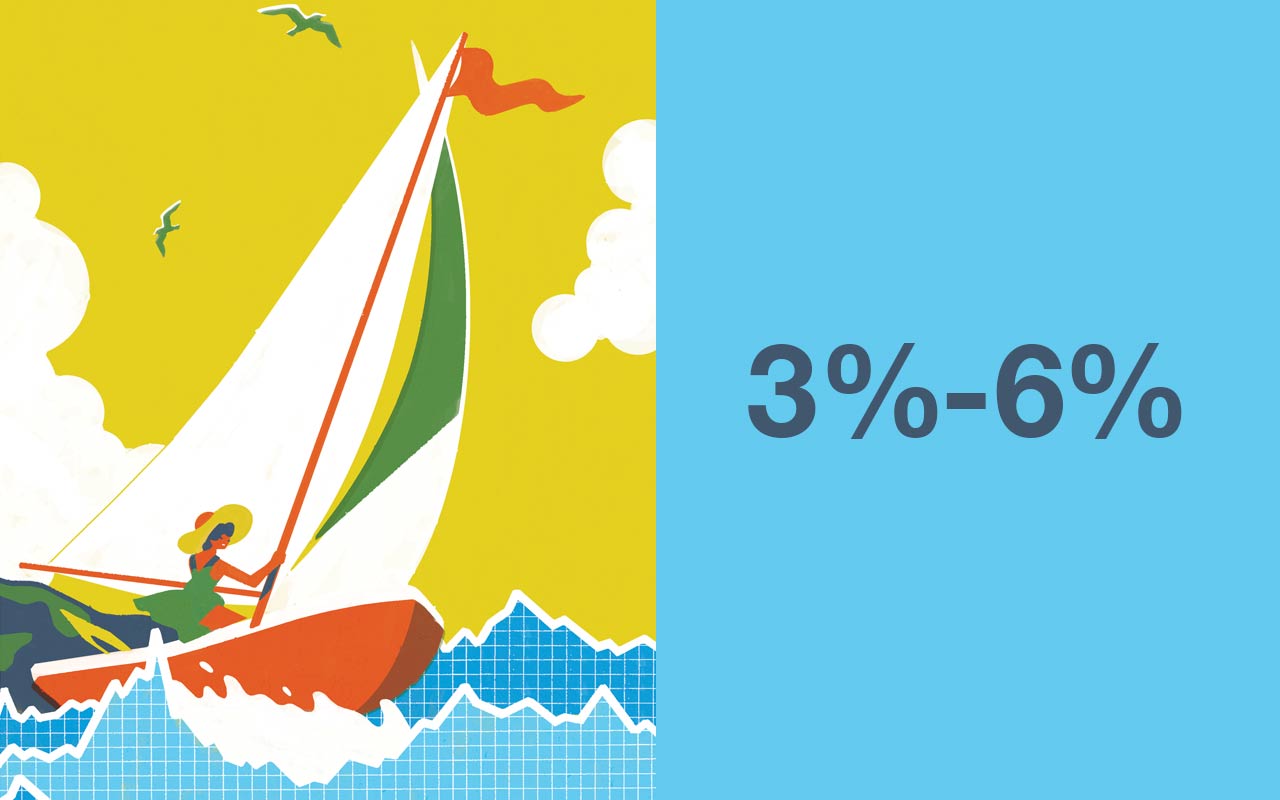
Dividend Stocks
Dividend stocks have one advantage that bonds don’t: They can, and often do, raise their payout. For example, Procter & Gamble (PG, $106, 2.7%), a member of the Kiplinger Dividend 15, the list of our favorite dividend-paying stocks, raised its dividend from $2.53 a share in 2014 to $2.84 in 2018, a 2.3% annualized increase.
Preferred stocks, like bonds, pay a fixed dividend and typically offer higher yields than common stocks. Banks and other financial services firms are the typical issuers, and, like most high-dividend investments, they are sensitive to changes in interest rates. Yields for preferreds are in the 6% range, and a generous crop of new issues offers plenty of choices.
- The risks: Dividend stocks are still stocks, and they will fall when the stock market does. Furthermore, Wall Street clobbers companies that cut their dividend. General Electric slashed its dividend to a penny per share on December 7, 2018, and the stock fell 4.7% that day.
- How to invest: Some slower-growing industries, such as utilities or telecommunications firms, tend to pay above-average dividends. Verizon Communications (VZ, $58, 4.2%), a Kip 15 dividend stock, is the largest wireless carrier in the U.S. Its investment in Fios fiber-optic cable should pay off in coming years. SPDR Portfolio S&P 500 High Dividend ETF (SPYD, $39, 4.3%) tracks the highest-yielding stocks in the S&P 500 index. The fund has 80 holdings and is sufficiently diversified to handle a clunker or two.
- Utility PPL Corp. (PPL, $31, 5.3%) derives more than 50% of its earnings from the United Kingdom. Worries that the U.K.’s departure from the European Union will pressure PPL’s earnings have weighed on the stock’s price, boosting its yield. Nevertheless, PPL’s U.S. operations provide strong support for the company’s generous payout.
Ma Bell is a Dividend Aristocrat, meaning that AT&T (T, $32, 6.4%) has raised its dividend for at least 25 consecutive years (35 straight years, in AT&T’s case). The company has plenty of free cash flow to keep raising its payout.
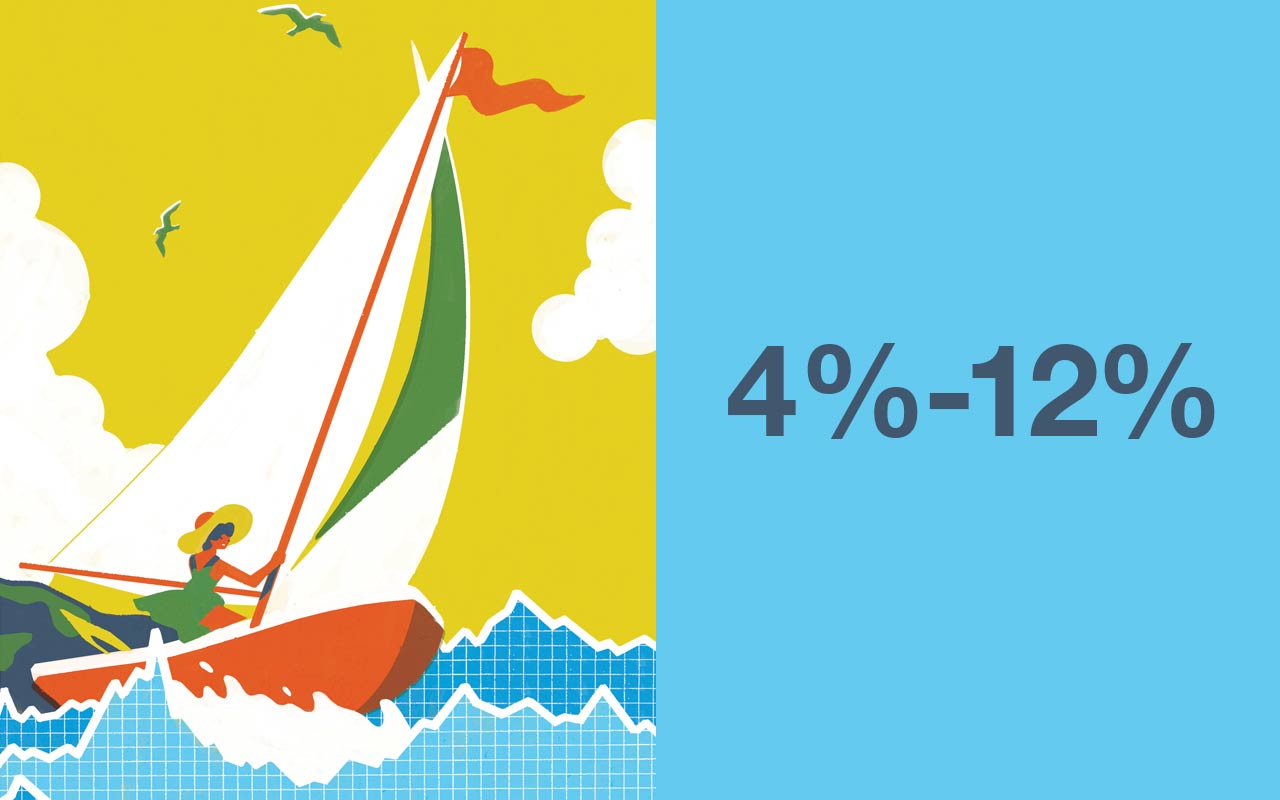
Real Estate Investment Trusts
You can invest in two types of REITs: those that invest in property and those that invest in mortgages. Both types must pass on at least 90% of their revenue to investors, which is partly why they have such excellent yields. Typically, REITs that invest in income-producing real estate have lower yields than those that invest in mortgages.
The average property REIT yields 4.1%, compared with the average mortgage REIT yield of 10.6%, according to the National Association of Real Estate Investment Trusts. Why the big difference? Property REITs rack up expenses when they buy and sell income properties or lease them out as landlords. Mortgage REITs either buy mortgages or originate them, using borrowed money or money raised through selling shares as their capital.
- The risks: When the economy slows down, so does the real estate market, and most REITs will take a hit in a recession. Mortgage REITs are exceptionally sensitive to interest rate increases, which squeeze their profit margins, and to recessions, which increase the likelihood of loan defaults.
- How to invest: Realty Income Corp. (O, $69, 4.0%) invests in property and rents it to large, dependable corporations, such as Walgreens, 7-Eleven and Fed-Ex. It’s a Kiplinger 15 dividend stalwart and pays dividends monthly.
- Fidelity Real Estate Income (FRIFX, 4.0%) isn’t a REIT, although it invests in them (among other things). The fund puts income first. It has 43% of its assets in bonds, most of them issued by REITs. The fund lost 0.6% in 2018, compared with a 6% loss for other real estate funds.
- Annaly Capital Management (NLY, $10, 12%) is a REIT that borrows cheaply to buy government-guaranteed mortgage securities. Most of those holdings are rated AA+ or better. Annaly boosts its yield by investing in and originating commercial real estate loans and by making loans to private equity firms. Its 2018 purchase of MTGE Investment, a mortgage REIT that specializes in skilled nursing and senior living facilities, will help diversify the firm’s portfolio. Annaly is the largest holding of iShares Mortgage Real Estate Capped ETF.
Investors will forgive a lot in exchange for a high yield. In the case of iShares Mortgage Real Estate Capped ETF (REM, $44, 8.2%), they’re choosing to accept a high degree of concentration: The top four holdings account for 44% of the ETF’s portfolio. Although concentration can increase risk, in this instance the fund’s huge position in mortgage REITs has helped returns. Falling interest rates late in 2018 pushed up mortgage REITs, limiting the fund’s losses to just 3% in 2018.

Foreign Bonds
If you think interest rates are low in the U.S., note that most developed foreign countries have even lower rates because their economies are growing slowly and inflation is low. The U.K.’s 10-year bond pays just 1.2%; Germany’s 10-year bond yields 0.1%; Japan’s yields –0.03%. There’s no reason to accept those yields for a day, much less a decade.
You can, by contrast, find decent yields in some emerging countries. Emerging-markets bonds typically yield roughly four to five percentage points more than comparable U.S. Treasury bonds, which would put yields on some 10-year EM debt at about 7%, says Pramol Dhawan, emerging-markets portfolio manager at bond fund giant Pimco.
- The risks: You need a healthy tolerance for risk to invest in emerging-markets bonds. U.S. investors tend to be leery of them because they remember massive defaults and currency devaluations, such as those that occurred in Asia in the late 1990s. But in the wake of such debacles, many emerging countries have learned to manage their debt and their currencies better than in the past.
- How to invest: Dodge & Cox Global Bond (DODLX, 4.5%) can invest anywhere, but lately it has favored U.S. bonds, which were recently 48% of the portfolio. The fund’s major international holdings show that it isn’t afraid to invest in dicey areas—it has 11% of its assets in Mexican bonds and 7% in United Kingdom bonds.
- Fidelity New Markets Income (FNMIX, 5.6%), a Kip 25 fund, has been run by John Carlson since 1995. That makes him one of the few emerging-markets debt managers who ran a portfolio during the currency-triggered meltdown in 1997-98. He prefers debt denominated in dollars, which accounts for 94% of the portfolio. But he can be adventurous: About 6.5% of the fund’s assets are in Turkey, which is currently struggling with a 19% inflation rate and a 14.7% unemployment rate.
- IShares Emerging Markets High Yield Bond ETF (EMHY, $46, 6.2%) tracks emerging-markets corporate and government bonds with above-average yields. The holdings are denominated in dollars, so there’s less currency risk. But this is not a low-risk holding. It’s more than twice as volatile as the U.S. bond market, although still only half as volatile as emerging-markets stocks.
But currency is still a key consideration. When the U.S. dollar rises in value, overseas gains translate into fewer greenbacks. When the dollar falls, however, you’ll get a boost in your return. A higher dollar can also put pressure on foreign debt denominated in dollars—because as the dollar rises, so do interest payments.
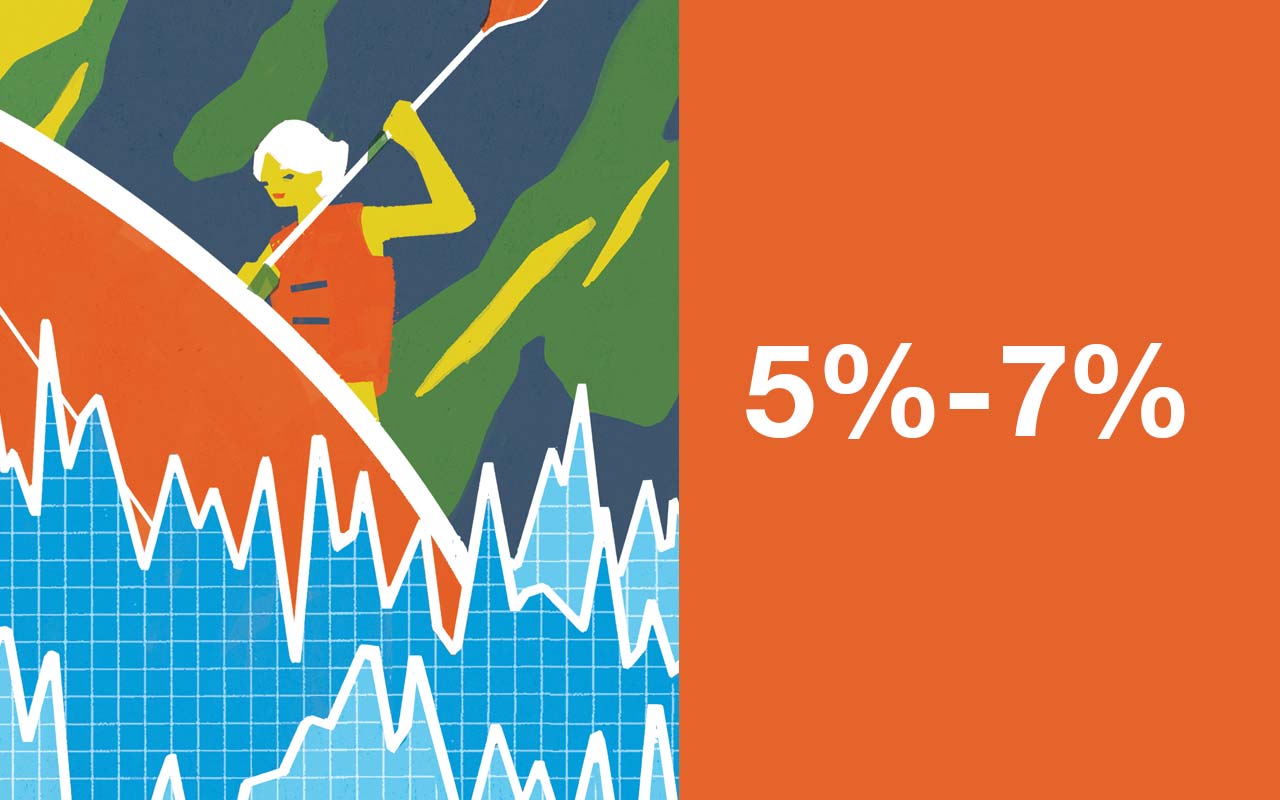
High-Yield Bonds
Junk bonds—or high-yield bonds, in Wall Street parlance—aren’t trash to income investors. Such bonds, which are rated BB+ or below, yield, on average, about 4.7 percentage points more than the 10-year T-note, says John Lonski, managing director for Moody’s Capital Markets Research Group.
What makes a junk bond junky? Typical high-yield bond issuers are companies that have fallen on hard times, or newer companies with problematic balance sheets. In good times, these companies can often make their payments in full and on time and can even see their credit ratings improve.
- The risks: You’re taking an above-average risk that your bond’s issuer will default. The median annual default rate for junk bonds since 1984 is 3.8%, according to Lonksi. In a recession, you could take a big hit. In 2008, the average junk bond fund fell 26%, even with reinvested interest.
- How to invest: RiverPark Strategic Income (RSIVX, 4.8%) is a mix of cash and short-term high-yield and investment-grade bonds. Managers choose bonds with a very low duration, to cut interest rate risk, and a relatively low chance of default.
- Vanguard High-Yield Corporate (VWEHX, 5.5%), a Kip 25 fund, charges just 0.23% in expenses and invests mainly in the just-below-investment-grade arena, in issues from companies such as Sprint and Univision Communications.
- SPDR Bloomberg Barclays High Yield Bond ETF (JNK, $36, 5.8%) charges 0.40% in expenses and tracks the Barclays High Yield Very Liquid index—meaning that it invests only in easily traded bonds. That’s a comfort in a down market because when the junk market turns down, buyers tend to dry up. The fund may lag its peers in a hot market, however, as some of the highest-yielding issues can also be the least liquid.
Investors who are bullish on the economy might consider Northern High Yield Fixed Income Fund (NHFIX, 7.0%). The fund owns a significant slice of the junkier corner of the bond market, with about 23% of its holdings rated below B by Standard & Poor’s. These bonds are especially vulnerable to economic downturns but compensate investors willing to take that risk with a generous yield.
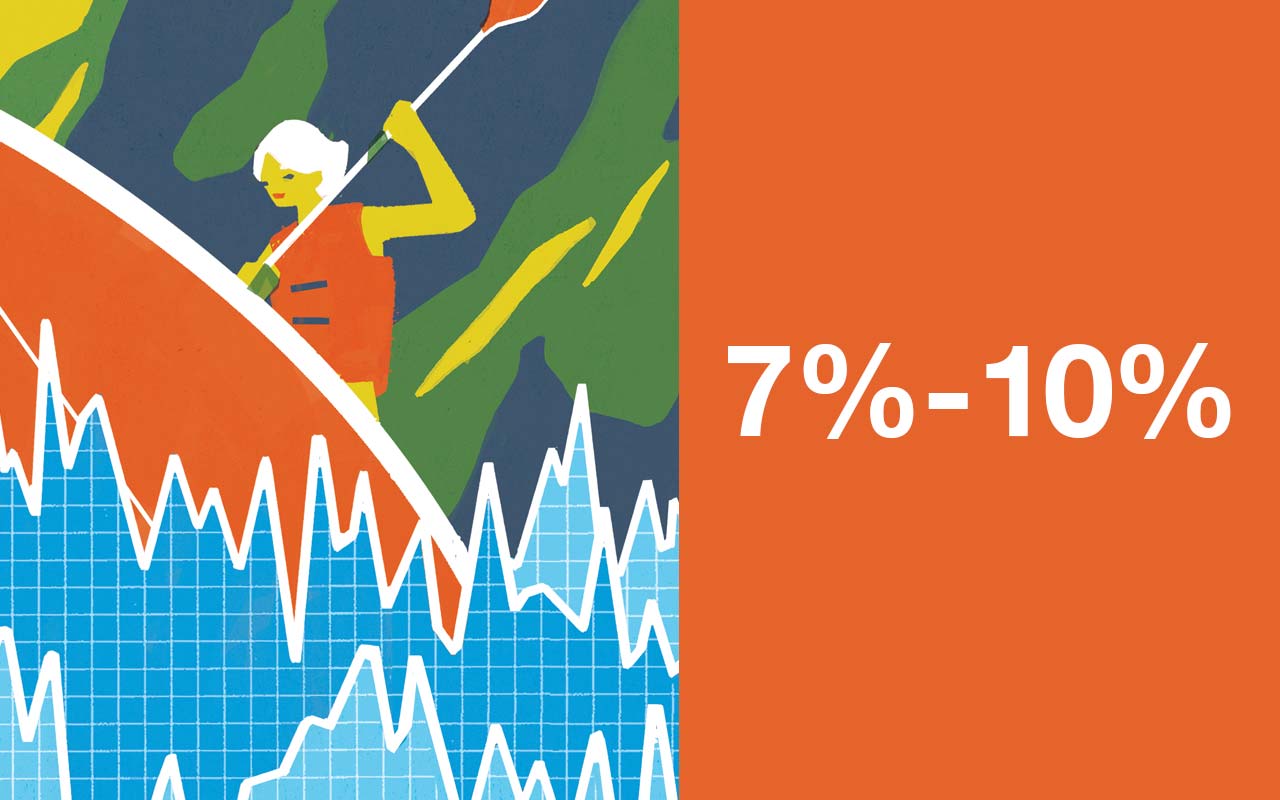
Master Limited Partnerships
You might be surprised to learn how much income you can generate from moving hydrocarbons from one place to another. Most MLPs are spin-offs from energy firms and typically operate gas or oil pipelines.
MLPs pay out most of their income to investors and don’t pay corporate income taxes on that income. Those who buy individual MLPs will receive a K-1 tax form, which spells out the income, losses, deductions and credits that the business earned and your share of each. Most MLP ETFs and mutual funds don’t have to issue a K-1; you’ll get a 1099 form reporting the income you received from the fund.
- The risks: In theory, energy MLPs should be somewhat immune to changes in oil prices; they collect fees on the amount they move, no matter what the price. In practice, when oil gets clobbered, so do MLPs—as investors learned in 2015, when the price of West Texas intermediate crude fell from $53 a barrel to a low of $35 and MLPs slid an average 35%. Oil prices should be relatively stable this year, and high production levels should mean a good year for pipeline firms.
- How to invest: Magellan Midstream Partners (MMP, $62, 6.5%) has a 9,700-mile pipeline system for refined products, such as gasoline, and 2,200 miles of oil pipelines. The MLP has a solid history of raising its payout (called a distribution) and expects a 5% annual increase in 2019.
The giant of MLP ETFs, Alerian MLP ETF (AMLP, $10, 7.2%), boasts $9 billion in assets and delivers a high yield with reasonable expenses of 0.85% a year. Structured as a C corporation, the fund must pay taxes on its income and gains. That can be a drag on yields compared with MLPs that operate under the traditional partnership structure. EQM Midstream Partners (EQM, $46, 10.1%) is active in the Appalachian Basin and has about 950 miles of interstate pipelines. The firm paid $4.40 in distributions per unit last year and expects to boost that to $4.58 in 2019.
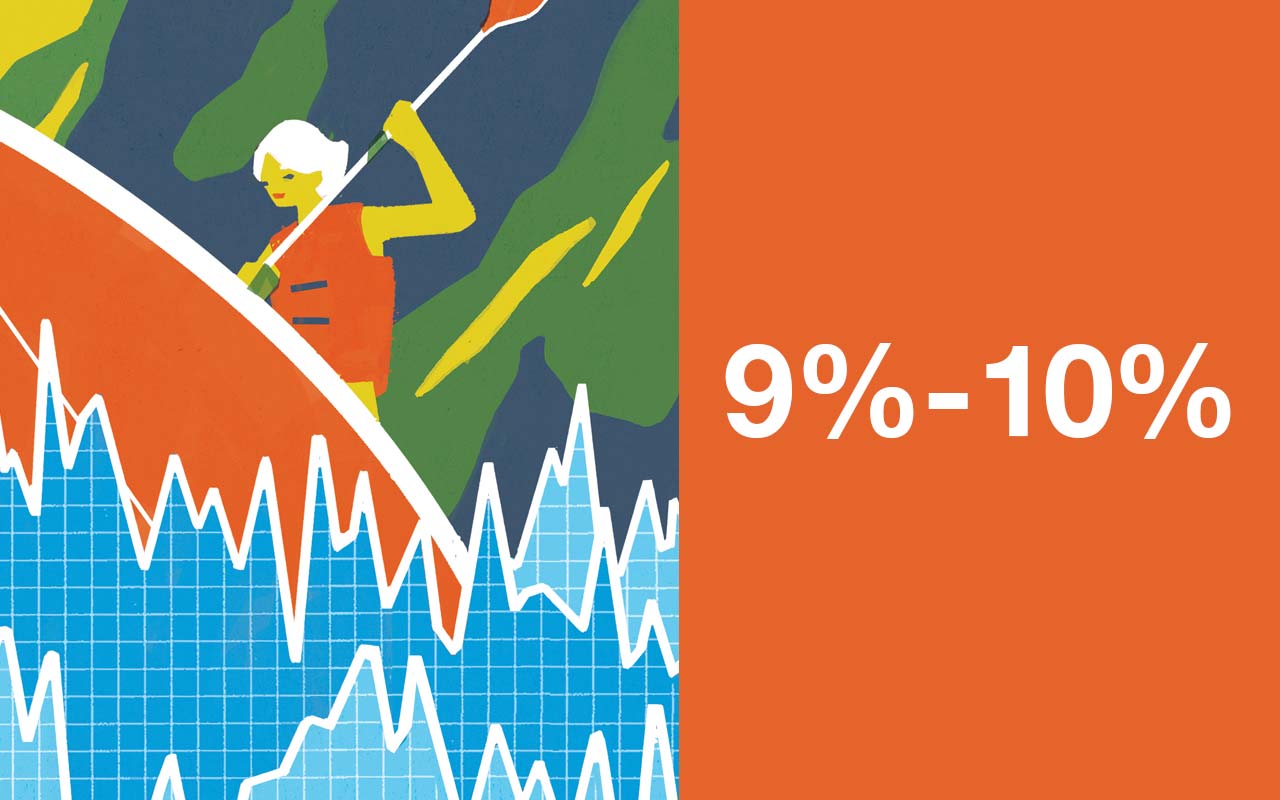
Closed-End Funds
Closed-end funds (CEFs) are the forebears of mutual funds and ETFs. A closed-end fund raises money through an initial stock offering and invests that money in stocks, bonds and other types of securities, says John Cole Scott, chief investment officer, Closed-End Fund Advisors.
The fund’s share price depends on investors’ opinion of how its picks will fare. Typically, the fund’s share price is less than the current, per-share value of its holdings—meaning that the fund trades at a discount. In the best outcome, investors will drive the price up to or beyond the market value of the fund’s holdings. In the worst case, the fund’s discount will steepen.
- The risks: Many closed-end income funds borrow to invest, which can amplify their yields but increase their price sensitivity to changes in interest rates. Most CEFs have higher expense ratios than mutual funds or ETFs, too.
- How to invest: Ares Dynamic Credit Allocation Fund (ARDC, $15, 8.5%) invests in a mix of senior bank loans and corporate bonds, almost all of which are rated below investment grade. Borrowed money as a percentage of assets—an important indicator for closed-end funds known as the leverage ratio—is 29.6%, which is a tad lower than the average of 33% for closed-end funds overall. The fund’s discount to the value of its holdings has been narrowing of late but still stands at 12.1%, compared with 11.2%, on average, for the past three years.
- Advent Claymore Convertible Securities and Income Fund (AVK, $15, 9.4%), run by Guggenheim Investments, specializes in convertible bonds, which can be exchanged for common stock under some conditions. The fund also holds some high-yield bonds. Currently, it’s goosing returns with 40% leverage, which means there’s above-average risk if rates rise. For intrepid investors, the fund is a bargain, selling at a discount of 10.6%, about average for the past three years.
- Clearbridge Energy Midstream Opportunity (EMO, $9, 9.7%) invests in energy master limited partnerships. It sells at a 12.1% discount, compared with a 6.6% average discount for the past three years. Its leverage ratio is 33%—about average for similar closed-end funds.
Profit and prosper with the best of Kiplinger's advice on investing, taxes, retirement, personal finance and much more. Delivered daily. Enter your email in the box and click Sign Me Up.

-
 Quiz: Do You Know How to Avoid the "Medigap Trap?"
Quiz: Do You Know How to Avoid the "Medigap Trap?"Quiz Test your basic knowledge of the "Medigap Trap" in our quick quiz.
-
 5 Top Tax-Efficient Mutual Funds for Smarter Investing
5 Top Tax-Efficient Mutual Funds for Smarter InvestingMutual funds are many things, but "tax-friendly" usually isn't one of them. These are the exceptions.
-
 AI Sparks Existential Crisis for Software Stocks
AI Sparks Existential Crisis for Software StocksThe Kiplinger Letter Fears that SaaS subscription software could be rendered obsolete by artificial intelligence make investors jittery.
-
 Big Change Coming to the Federal Reserve
Big Change Coming to the Federal ReserveThe Lette A new chairman of the Federal Reserve has been named. What will this mean for the economy?
-
 Job Growth Sizzled to Start the Year. Here's Why It's Unlikely to Impact Interest Rates
Job Growth Sizzled to Start the Year. Here's Why It's Unlikely to Impact Interest RatesThe January jobs report came in much stronger than expected and the unemployment rate ticked lower to start 2026, easing worries about a slowing labor market.
-
 Why the Next Fed Chair Decision May Be the Most Consequential in Decades
Why the Next Fed Chair Decision May Be the Most Consequential in DecadesKevin Warsh, Trump's Federal Reserve chair nominee, faces a delicate balancing act, both political and economic.
-
 The New Fed Chair Was Announced: What You Need to Know
The New Fed Chair Was Announced: What You Need to KnowPresident Donald Trump announced Kevin Warsh as his selection for the next chair of the Federal Reserve, who will replace Jerome Powell.
-
 January Fed Meeting: Updates and Commentary
January Fed Meeting: Updates and CommentaryThe January Fed meeting marked the first central bank gathering of 2026, with Fed Chair Powell & Co. voting to keep interest rates unchanged.
-
 The December CPI Report Is Out. Here's What It Means for the Fed's Next Move
The December CPI Report Is Out. Here's What It Means for the Fed's Next MoveThe December CPI report came in lighter than expected, but housing costs remain an overhang.
-
 How Worried Should Investors Be About a Jerome Powell Investigation?
How Worried Should Investors Be About a Jerome Powell Investigation?The Justice Department served subpoenas on the Fed about a project to remodel the central bank's historic buildings.
-
 The December Jobs Report Is Out. Here's What It Means for the Next Fed Meeting
The December Jobs Report Is Out. Here's What It Means for the Next Fed MeetingThe December jobs report signaled a sluggish labor market, but it's not weak enough for the Fed to cut rates later this month.
